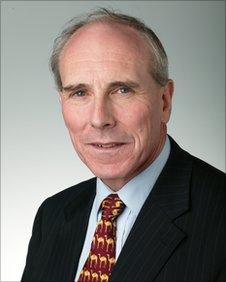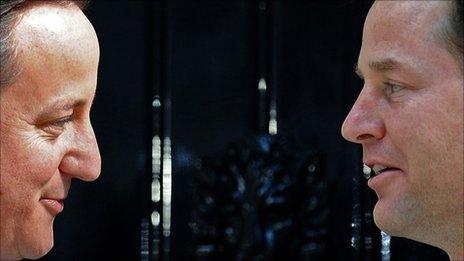One man's stand against the coalition
- Published
- comments
A year ago most Liberal Democrat politicians were feeling pleased with themselves. A little hesitant about taking power, but eager for what they called a once-in-a-generation opportunity.
When Lib Dem MPs and Lords and members of the Federal Executive, external gathered to endorse the coalition agreement at Local Government House, Paddy Ashdown, external backed it, Ming Campbell, external gave it his blessing; even radical Liberals like Duncan Brack backed the deal with the Conservatives, external.
When it came to a vote just one hand was raised against the agreement.

David Rendel had argued against the introduction of tuition fees by Labour
And until now the former MP for Newbury in Berkshire, David Rendel, external, has not talked about what was a private meeting, but after the local elections he sat down to talk on camera about the reasons why he felt he had to withhold his endorsement.
"It was very lonely being on my own. I was with a group of about 250 people - all of whom I liked and respected.
"But I said in my speech that I felt this was a short-term government and all we would get would be short-term gains. Come the next election there was every chance we would go back to a minority government and any gains would be wiped out."
Alone amongst those in the room he concluded that the reaction of the public was not worth the compromise.
'Bitterly disappointed'
Lib Dem voters stated conclusively last week that they felt the party was on a train heading in a completely different direction to the ticket they bought. Now they were hitched to the Conservative engine where previously the third party vote could have many different destinations.
Rendel calls the loss of the referendum on electoral reform "a disaster" and feels most betrayed by the tuition fee policy.
As Higher Education spokesman in Parliament he argued against the introduction of fees by Labour. Now he says: "I felt bitterly disappointed by the hash that we made of tuition fees, in so many ways."
But now he thinks the coalition must continue.
"I don't think there's any point now in ending the coalition at this stage. If we did we would simply lose all the quicker all the short-term gains we have made.
"I think the coalition's got to face up to the fact that the depth, strength and speed at which these cuts have been made is, I think, damaging the recovery."
As to Nick Clegg, external's own position as leader, it is difficult to see any Liberal Democrat justifying turning on the man who managed to get such an overwhelming number of party members behind his policies.
The decision was also endorsed by a special party conference on 16 May 2010, external where it was reported that only 50 voted against out of a total of some 1,500 delegates.
But David Rendel will always remember the day he was the only man to stand against the prevailing mood of his party.
"I felt very lonely indeed. You can feel lonelier, I think, when you are standing up amongst colleagues and friends and opposing what they want to do, than you would if you were among enemies and opposing what they want to do."
"I felt I was not exactly betraying my friends but clearly I was doing something they would rather I didn't do - and it is never fun to oppose people who you believe in and agree with for the most part, and trust and respect."
- Published11 May 2011
